< Reconstruction:Proto-Turkic
Reconstruction:Proto-Turkic/buŕagu
Proto-Turkic
Etymology
Presumably from *buŕ-a- (“to bear a calf”) + *-gu. Cognate to Proto-Mongolic *biraxu (“calf”), however Mongolic might be a loanword.
The g-sounds in the middle of Proto-Turkic words are always x (ɣ) in Proto-Mongolic: Proto-Turkic *egir- (“to twist, spin”), Proto-Mongolic *exere- (“to twist”); Proto-Turkic *kagur- (“to roast, fry”), Proto-Mongolic *kaxur- (“to roast, bake, fry”); Proto-Turkic *yegin (“nephew”), Proto-Mongolic *jexe (“grandson, nephew”); Proto-Turkic *sag- (“to milk”), Proto-Mongolic *saxa- (“to milk”); Proto-Turkic *sagrï (“croup skin, shagreen”), Proto-Mongolic *saxari (“shagreen, callus”); Proto-Turkic *bögür (“kidney(s)”), Proto-Mongolic *böxere (“kidney(s)”)...
Declension
Declension of *buŕagu
| Singular 3) | |
|---|---|
| Nominative | *buŕagu |
| Accusative | *buŕagunu, *buŕagunug 1) |
| Genitive | *buŕagunuŋ |
| Dative | *buŕaguka |
| Locative | *buŕaguda |
| Ablative | *buŕagudan |
| Instrumental 2) | *buŕagun |
| Equative 2) | *buŕaguča |
1) Found in early Proto-Turkic.
2) The original instrumental and equative cases have fallen into disuse in many Turkic languages.
3) Plurality is disputed in Proto-Turkic. See also the notes on the Proto-Turkic/Locative-ablative case and plurality page in Wikibooks.
2) The original instrumental and equative cases have fallen into disuse in many Turkic languages.
3) Plurality is disputed in Proto-Turkic. See also the notes on the Proto-Turkic/Locative-ablative case and plurality page in Wikibooks.
Derived terms
- *buŕagu-la-
Descendants
- Proto-Oghuz: *buzaɣu
- Karluk:
- Kipchak:
- Kipchak: بوزاو (buzaw)
- Mamluk-Kipchak: بوزاغو (buzaɣu), بوزاو (buzawu)
- North Kipchak:
- West Kipchak:
- South Kipchak:
- Kipchak: بوزاو (buzaw)
- Siberian:
- →? Proto-Mongolic: *biraxu
See also
| Animals in Proto-Turkic | |||||
|---|---|---|---|---|---|
 Dog |
dog: *it |
 Hunting Dog |
hunting dog: *eker |
 Hen |
hen: *tiakïgu |
 Lark |
lark: *torgay |
 Pigeon |
dove, pigeon: *kȫkerčin |
 Quail |
quail: *bïldurčïn |
 Sparrow |
sparrow: *serče | .jpg.webp) Hawk |
hawk, falcon: *kïrguy |
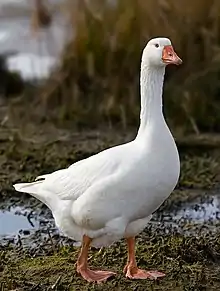 Goose |
goose: *kāŕ |
.jpg.webp) Wolf |
wolf: *bȫrü |
 Cow |
cow: *ingek |
 Calf |
calf: *buŕagu |
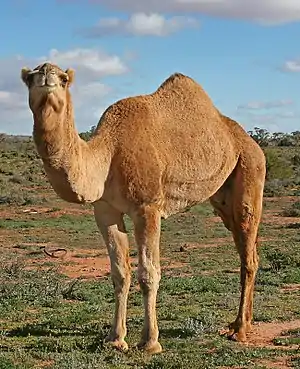 Camel |
camel: *tebe |
.jpg.webp) Young Camel |
young of camel: *kȫĺek, *botu |
 Horse |
horse: *at |
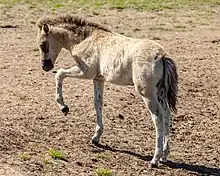 Foal |
foal: *kulum |
.jpg.webp) Worm |
worm: *kūrt |
 Snake |
snake: *yï̄lan |
_(4).jpg.webp) Fox |
fox: *tilkü |  goat |
goat: *keči | 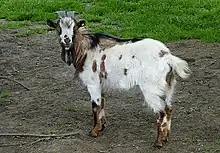 He-goat |
he-goat: *teke |
_male_6y.jpg.webp) Lion |
lion: *arsïlan |
 Fish |
fish: *bālïk | Abramis brama |
carp bream: *čapak |
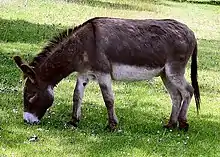 Donkey |
donkey: *eĺčgek |  Carp |
carp: *saŕgan | 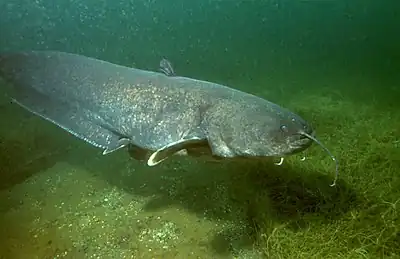 Catfish |
catfish: *yāyïn |
 Beaver |
beaver: *kunduŕ |  Hedgehog |
hedgehog: *kirpi |  Badger |
badger: *borsmuk |
 Fly |
fly, mosquito: *siŋek |  Bee |
wasp, bee: *ārï | .jpg.webp) Fish |
gadfly: *bȫgen |
_2.jpg.webp) Moth |
moth: *küńe | 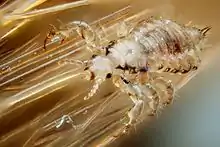 Louse |
louse: *bït | 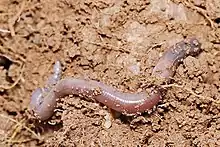 Earthworm |
earthworm: *sïbuĺgan |
References
- Starostin, Sergei; Dybo, Anna; Mudrak, Oleg (2003), “*bi̯ŏ́ŕu”, in Etymological dictionary of the Altaic languages (Handbuch der Orientalistik; VIII.8), Leiden, New York, Köln: E.J. Brill
- Clauson, Gerard (1972), “buza:ğu:”, in An Etymological Dictionary of pre-thirteenth-century Turkish, Oxford: Clarendon Press, page 391
This article is issued from Wiktionary. The text is licensed under Creative Commons - Attribution - Sharealike. Additional terms may apply for the media files.